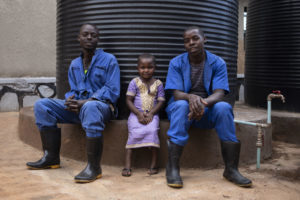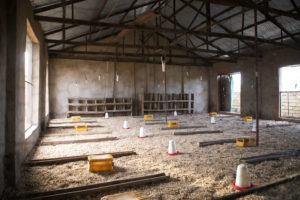
When I think of Abdoul, I think of peace. He speaks softly, in English and in Kinyarwanda, and listens loudly, eyes wide, leaning forward to hear you better. He feels like the friend you can sit in silence with for hours doing nothing.
But Abdoul is far from a man who does nothing. 34 years old, and a survivor of the genocide in Rwanda in 1994, Abdoul is now the owner of his own chicken farming business.

“I started the business 19 months ago, and am now in phase 2 of my plan. I have 1,000 chickens that lay 870 eggs every day.”
In many ways, Abdoul’s story resembles his Western counterparts: he worked hard, he had a job while he studied, he came up with an idea for his business while studying for his Masters, and it was a good idea. But in other striking ways his story is vastly different.
Abdoul’s Earlier Years
Abdoul was 9 years old in 1994 when the genocide took place in Rwanda and over 800,000 Tutsis were killed by Hutu extremists in the space of 100 days. He was one of 6 children in his family. He recalls surviving the genocide by hiding in the swamp and eating sweet potatoes raw from the ground. During the genocide he was separated from the rest of his family, but one day he found his sister in the river. She had been hit in the head, her skull was cracked, and she’d been thrown in the river to die. Abdoul bandaged her head with grass from the swamp to keep her head together. Today, his sister is a lawyer.
After the genocide, he was taken in by his uncle and at the age of 15 became a professional driver. At one point he was the driver for the director of a newspaper and was told that he could take the car out when it wasn’t being used to make extra money. It was while he was doing this that he met Network 4 Africa Founder, Rebecca Tinsley.
Rebecca asked him why he wasn’t in school. Like many Rwandan genocide orphans, he had to work. But Abdoul was fortunate to be sponsored to return to education. Today, a portrait of Becky and her husband sits above the desk in his office at The Smart Chicken Project, a testament to that act of generosity.
Getting Down to Business
“I import the chicks from Holland” he explains, “Because they have the best eggs.” The eggs he shows us look like the ones in my local supermarket in London, but compared to the local eggs in Kigali, they are about twice the size.
“When I pick up the chicks from the airport, I have to drive like the wind!” he tells me, “But on the way to sell the eggs, I have to drive slowly, gently…”
The mental image tickles me. I’ve spent days being driven around Rwandan roads, and my skeleton is feeling the pain. I picture Abdoul driving his truck up the hills carrying a brood of tiny chicks, desperate to get them into the warmth of the room he has waiting for them on his farm.
Looking Ahead
Someday Abdoul hopes to have 5,000 chickens and to set up workshops for the community to train them in setting up a similar business to his own.
To learn more about Abdoul’s project, visit: http://kigalismartchicken.simplesite.com/
Our thanks go to Chrystal Ding for this piece. Chrystal is an Artist, Photographer, and Writer currently working on a project with genocide survivors with the support of the Rebecca Vassie Memorial Award 2019.